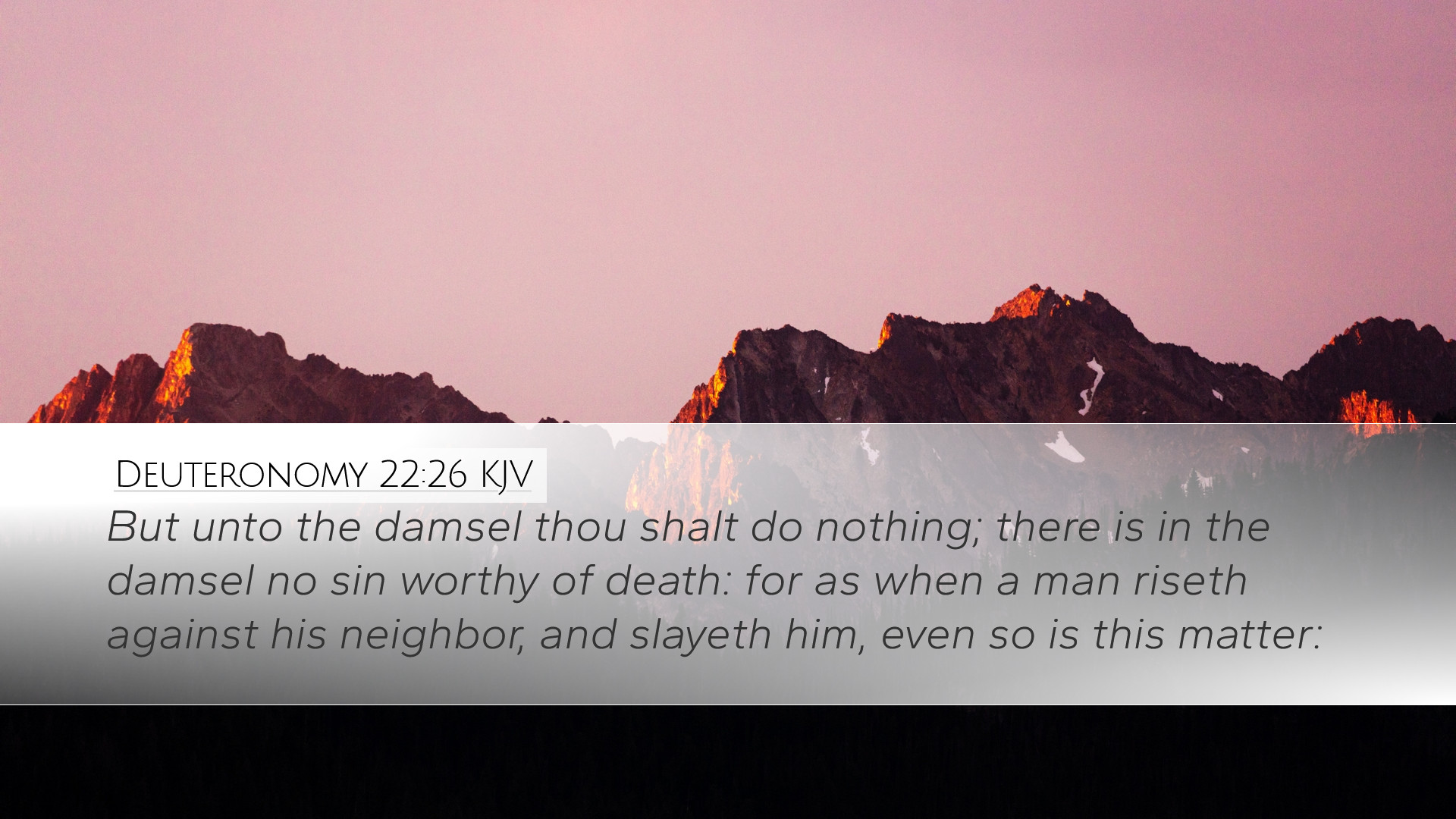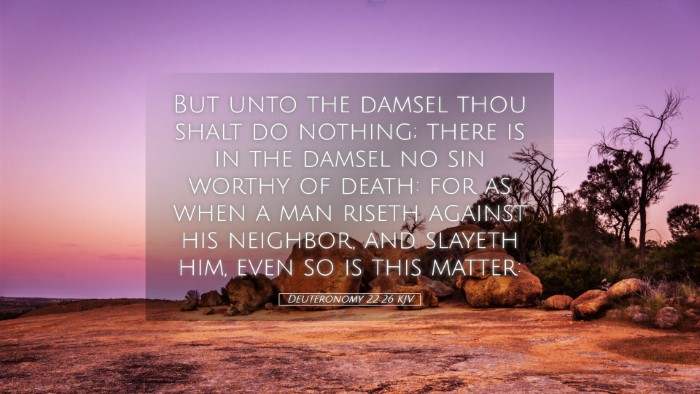Commentary on Deuteronomy 22:26
Text of Deuteronomy 22:26:
"But unto the damsel thou shalt do nothing; there is in the damsel no sin worthy of death: for as when a man riseth against his neighbour, and slayeth him, even so is this matter."
In Deuteronomy 22:26, we find an important verse that addresses the moral and ethical considerations surrounding a case of sexual misconduct. This passage is part of a larger section in Deuteronomy that provides laws concerning various social and ethical issues in ancient Israel.
Historical Context
The laws given in the book of Deuteronomy can be understood within the context of Israel’s society as it transitioned from a nomadic lifestyle to that of a settled agricultural community in the Promised Land. The standards set forth herein were designed to ensure justice and moral rectitude among the people, reflecting God’s character and fostering an environment of righteousness.
Commentary Insights
Matthew Henry's Commentary
Matthew Henry highlights that the passage serves to protect the woman involved in the case of assumed wrongs. He emphasizes the fundamental principle that the guilt of the crime lies with the aggressor, not the victim. Henry states:
"The innocent are to be considered as such, and the actions of the one do not justify harm to the other."
According to Henry, the legal framework provided in the verse reflects God’s justice, portraying the damsel as innocent unless evidence suggests otherwise. The balance of justice is critical to societal harmony, and any deviation could lead to further injustice and disorder.
Albert Barnes' Commentary
Albert Barnes elaborates on the societal implications of this law. He points out that the underlying principle of the verse is to emphasize the non-punitive nature of the victim. Barnes observes:
"This law is designed to prevent the victimization of women in a patriarchal society, safeguarding them against societal scorn and punishment for the actions of men."
He affirms that the nature of the relationship between man and woman must be viewed through the lens of mutual accountability and respect. The heart of the law aims to cultivate a society where the misconduct is dealt with appropriately and the innocent are protected.
Adam Clarke's Commentary
Adam Clarke adds depth by emphasizing the broader ethical implications of the penalty stated in the verse. He critiques the disparity in societal responses to men and women in cases of sexual misconduct. Clarke writes:
"In treating this case of assault with respect toward the woman, we see a clarion call for justice that does not propagate further injustice through the victimization of the innocent."
He also notes that the analogies drawn between the events of physical assault and the treatment of women serve as a reminder of humanity's need for compassion and understanding in justice. Clarke sees this as a foundational tenet for leaders and judges in Israelite society.
Theological Implications
The theological significance of Deuteronomy 22:26 can be appreciated through the lens of God's concern for justice and mercy. The verse not only highlights the gravity of sin but also the importance of perspective when considering issues of accountability and guilt. A few key theological themes emerge:
- Divine Justice: God’s law reflects the nature of divine justice, where offenders are held accountable, and victims are safeguarded.
- Innocence of the Victim: It underscores the biblical principle that the victim of sin is not responsible for the sin committed against them, emphasizing compassion for those who suffer harm.
- Human Dignity: The law protects the dignity and honor of all individuals, highlighting the intrinsic value of every person created in the image of God.
Practical Applications
For pastors, students, and theologians alike, Deuteronomy 22:26 calls for reflection on contemporary issues of justice, sexual ethics, and the protection of the vulnerable in society. Insights from the commentaries encourage various avenues of discussion:
- Advocating for the Vulnerable: The church is tasked with advocating for those who have been marginalized or victimized.
- Restoration and Healing: Encouraging paths of healing for victims should be a priority, reflecting Christ’s compassionate treatment of the wounded and outcast.
- Addressing Societal Justice: The church should engage in discussions of societal justice and ethics, aiming to align with the principles exemplified in this verse.
Conclusion
Ultimately, Deuteronomy 22:26 serves as a poignant reminder of God’s heart for justice blended with mercy. The insights gleaned from commentaries by Matthew Henry, Albert Barnes, and Adam Clarke encourage readers to deeply consider the implications of this law on both a personal and societal level. In a world that often blurs the lines of justice, this verse calls believers to uphold the principles of righteousness while ensuring protection for those wronged. As we engage with scripture, may we pursue a deeper understanding of God's heart for justice and the value of every individual.


